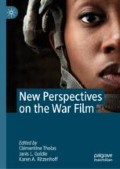Abstract
Yael Munk analyzes the Israeli anti-war film, Avanti Popolo (1986), and argues that its director, Rafi Bukaee, focuses on the enemy perspective in order to work through his own perpetrator’s trauma as a reserve soldier. Utilizing both the film and an interview from the director as analytical basis, Munk makes the convincing case that the surrealistic narrative of Avanti Popolo as well as its emphasis on the enemy is proof that Bukaee is processing his own trauma from the war and is commenting on the role of the Israeli military more generally. Using a discrete, more chronologically distanced, and more socially uncontested war in Israel to tackle this issue, Bukaee manages to evoke compassion, humanism, and pity for all those involved in war, including the perpetrator, as Munk displays.
Access this chapter
Tax calculation will be finalised at checkout
Purchases are for personal use only
Works Cited
Anzaldúa, Gloria E. Borderlands/La Frontera: The New Mestiza. San Francisco: Aunt Lute Books, 1999 [1987].
Bukaee, Rafi. “Rafi Bukaee: Shylock du desert.” Interview by Michèle Driguez and Henri Talvat, Cinema Mediterraneen Montpellier. Actes des 10e rencontres, 101–7. Montpellier: Federations des Oeuvres Laiques de l’Herault, 1989.
Bursztyn, Igal. “Promesse de Bonheur in Nowhere: Fantasies of Art and Beauty in Israeli and Palestinian Films—Part 2.” Deliberately Considered, December 13, 2011. http://www.deliberatelyconsidered.com/2011/12/promesse-de-bonheur-in-nowhere-fantasies-of-art-beauty-in-israeli-and-palestinian-films-part-2/.
Caruth, Cathy. Unclaimed Experience: Trauma, Narrative, and History. Baltimore: Johns Hopkins University Press, 1996.
Chapman, James. War and Film. London: Reaktion Book, 2008.
Elsaesser, Thomas. “‘One Train May Be Hiding Another’: Private History, Memory and National Identity.” Screening the Past 6 (1999): 16. http://www.screeningthepast.com/2014/12/one-train-may-be-hiding-another-private-history-memory-and-national-identity/.
Fisher, David. Morality and War: Can War Be Just in the Twenty First Century. London: Oxford University Press, 2012.
Gertz, Nurith. Motion Fiction: Israeli Fiction in Film [Sipur MeHaSratim: HaSiporet HaIsraelit VeYbudea LaKolnoa]. Tel-Aviv: The Open University Press, 1993.
———. “Avanti Popolo.” In The Israeli Cinema Book [Sefer HaKolnoa HaIsraeli], 2015 (Hebrew). www.cinemaofisrael.co.il.
———. “Between This Place and Other Places: The ‘Ethical Turn’ in Recent Israeli Cinema.” In Traces of Days to Come: Trauma and Ethics in Contemporary Israeli Cinema [Ikvot Iamim SheOd Iavohu: Trauma VeEthica BaKolnoa HaIsraeli HaAkhshavi], edited by Nurith Gertz and Raz Yosef, 213–42. Tel-Aviv: Am Oved, 2017 (Hebrew).
Haaretz. “Speech by Anwar Sadat in the Knesset.” https://www.haaretz.com/news/speech-by-anwar-sadat-in-the-knesset-1.45223. Accessed October 1, 2007.
LaCapra, Dominick. Writing History, Writing Trauma. Baltimore: Johns Hopkins University Press, 2001.
Neale, Steve. Film and Hollywood. London and New York: Routledge, 2000.
Ne’eman, Judd, and Yael Munk. “Avanti Popolo: Battle Cry of the Fallen.” In Film and the Middle East and North Africa, edited by Josef Gugler, 177–86. Austin: University of Texas Press, 2011.
Preminger, Aner. “The Arab Other in Israeli Cinema and Discourse.” Journalism and Mass Communication 2, no. 2 (February 2012): 412–20.
Shakespeare, William. Hamlet: The Tragedy of Hamlet, Prince of Denmark. New York: Simon & Shuster Paperbacks, 1992 [1609].
Shammas, Anton. “He Confused the Roles” [Hu Itbalbel BaTafkidim]. In Avanti Popolo, 7–17. Tel-Aviv: Kinneret Publishing House, 1990 (Hebrew).
Shohat, Ella. Israeli Cinema: East/West and the Politics of Representation. Austin: University of Texas Press, 1989.
Shuv, Yael. “The Palestinian as a Jew: A Repeat Dive to Avanti Popolo.” Cinematheque no. 202 (January 2017): 8–10 (Hebrew).
Turner, Victor. The Ritual Process: Structure and Anti-structure. New Brunswick and London: Transaction Publishers, 1969.
Films
2001: A Space Odyssey. Directed by Stanley Kubrick. USA, 1968.
Apocalypse Now. Directed by Francis Ford Coppola. USA, 1979.
Avanti Popolo. Directed by Rafi Bukaee. Israel, 1986.
Beaufort. Directed by Joseph Cedar. Israel, 2007.
Beyond the Walls. Directed by Uri Barabash. Israel, 1984.
Birth of a Nation. Directed by D.W. Griffith. USA, 1915.
Cup Final. Directed by Eran Riklis. Israel, 1991.
Every Bastard a King. Directed by Uri Zohar. Israel, 1968.
Field Diary. Directed by Amos Gitai. Israel, France, 1982.
Lebanon. Directed by Samuel Maoz. Israel, France, Germany, United Kingdom, 2009.
On a Narrow Bridge. Directed by Nissim Dayan. Israel, 1985.
Platoon. Directed by Oliver Stone. USA, 1986.
The Deer Hunter. Directed by Michael Cimino. USA, 1978.
Waltz with Bashir. Directed by Ari Folman. Israel, France, Germany, USA, Finland, Switzerland, Belgium, Australia, 2008.
Acknowledgements
I wish to thank my research assistant Sigal Yona for her precious work, my friend Ms. Maayan Miloh, Rafi Bukaee’s widow for the various conversations we held about the film, and Ms. Michèle Driguez from the Montpellier Festival in France for providing me with a copy of the original interview quoted in this article.
Author information
Authors and Affiliations
Editor information
Editors and Affiliations
Rights and permissions
Copyright information
© 2019 The Author(s)
About this chapter
Cite this chapter
Munk, Y. (2019). Rafi Bukaee’s Avanti Popolo : Telling the War from the Traumatized Perpetrator’s Perspective. In: Tholas, C., Goldie, J., Ritzenhoff, K. (eds) New Perspectives on the War Film. Palgrave Macmillan, Cham. https://doi.org/10.1007/978-3-030-23096-8_4
Download citation
DOI: https://doi.org/10.1007/978-3-030-23096-8_4
Published:
Publisher Name: Palgrave Macmillan, Cham
Print ISBN: 978-3-030-23095-1
Online ISBN: 978-3-030-23096-8
eBook Packages: Literature, Cultural and Media StudiesLiterature, Cultural and Media Studies (R0)

